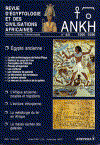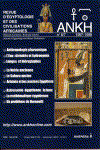|
ANKH n°4-5, 1995/1996, pp.
72 - 91.

ANKH n°6-7, 1997/1998, pp.
139 - 161.

|
Linéarité de l'histoire et l'idéal du progrès
au cours du IIIe millénaire avant J. C. en Égypte ancienne. Introduction à la
philosophie pharaonique de l'histoire
Résumé :
L'auteur examine dans cet
article la notion d'histoire en Égypte antique. Existait-il une véritable conception de
l'histoire en Égypte pharaonique ? Pour répondre à cette interrogation l'auteur fait
appel aux textes égyptiens et procède à une analyse sémantique de termes dont il
dégage les notions majeures caractérisant la vision pharaonique de l'histoire. Il montre
en particulier que les notions de futur, de progrès et d'innovation y sont clairement
présentes.
Abstract :
Linearity of history and the
ideal of progress along the third millenium before Christ in Ancient Egypt. —
The author studies in this article the notion of History in
Ancient Egypt. Is there a real conception of History in Pharaonic Egypt ? To answer to
this question the author calls for Egyptian texts and carries out a semantic analysis of
terms from which he draws up the major characteristical notions of the pharaonic vision of
History. He shows in particular how obviously the notions of future, progress and
innovation are already present.
ARISTOTE
et la mélanité des anciens Egyptiens
Résumé :
Les
anciens Egyptiens et la civilisation qu'ils ont créée appartiennent à l'univers négro-africain.
Toutefois, malgré l'évidence des faits (anthropologiques, culturels, linguistiques,
etc.) cette appartenance a été remise en question puis niée à partir du XIXe
siècle. Pourtant, des savants Grecs contemporains de l'époque du déclin de la
civilisation égyptienne (seconde moitié du dernier millénaire avant Jésus-Christ), ont
laissé des écrits qui font état sans ambiguïté du caractère nègre des anciens Egyptiens
et des Ethiopiens (habitants de la Nubie ancienne). Tel est le cas d'ARISTOTE, disciple
de PLATON, précepteur d'ALEXANDRE
LE GRAND. L'auteur, en se reportant directement aux textes grecs, analyse les
passages traitant de la "mélanité"
des Egyptiens pharaoniques. Il met ainsi en évidence les incohérences philologiques
introduites par certains traducteurs qui, en dépit de la précision et de la clarté du
texte grec, ont cherché, par préjugé, à dissimuler la parenté somatique étroite
existant entre les anciens Egyptiens et les autres peuples négro-africains.
Abstract :
ARISTOTLE and the Melanity of Ancient Egyptians. —
Ancient Egyptians and the civilisation they
created belong to the world of Black Africa. However, in spite of the evidence of the
(anthropological, cultural, linguistic and other) facts, this belonging has been
questioned again and then denied since the XIXth century. Therefore, Greek scientists
contemporary with the decline of the Egyptian civilisation (second period of the latest
millennium before Christ have left writings which note unequivocal the Negroid character
of Ancient Egyptians and Ethiopians (inhabitants of Ancient Nubia). Such is the case of ARISTOTLE, a disciple of PLATO, private tutor of ALEXANDER THE
GREAT. The author, directly referring to the Greek texts studies the passages
dealing with the "melanity" of Pharaonic Egyptians. He thus brings in the fore
the philological inconsistencies brought in by some translators who in spite of the
accuracy and the clarity of the Greek texts, have tried because of prejudice, to conceal
the close somatic relationship existing between Ancient Egyptians and other Black-African
populations.
|

